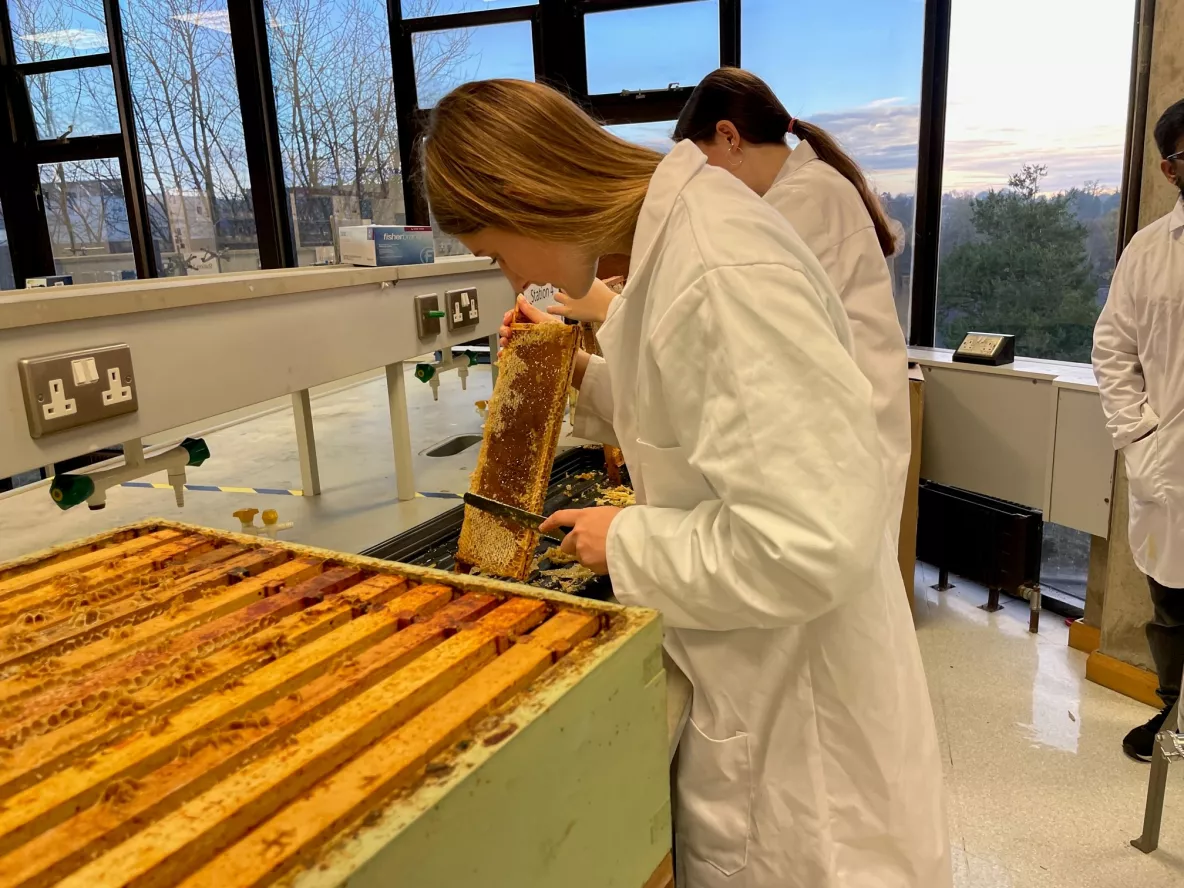

Registration now open!
To register your interest, please fill out this form: https://forms.office.com/e/1EJdjSzFbs
- Registration closes February 20, 2024.
- Course takes place over seven weeks on Wednesdays from 6.30-8.30pm
- Course Start Date: Wednesday, February 21, 2024
- Location: University of Limerick, Kemmy Building, Room KBG13
- Places in this year’s course are limited to 40 participants.
- Course open for UL staff (current/retired members) and UL students (current/visiting/placement).
The UL Environmental Committee and Buren Beekeeping Association are pleased to announce that registration is now open for 2024 Beginners Beekeeping Course (Bee and Hives Management).
Whether you are completely new to beekeeping or already have a few years as an apiarist under your belt, you will gain valuable insights from our seasoned instructors and their combined experience. This course will give a unique opportunity to all participants to hear from internationally recognized expert speakers from across Ireland and to build a new knowledge base, as well as confidence in this area. Participation in this course will also provide the opportunity to establish new connections with peer beekeepers across Limerick and Clare Countries, and other parts of Ireland. Our students leave with one thing in common: a newfound confidence to start their own hives and pursue their passion for beekeeping.
Topics covered:
- Biology of the Bee
- The Beekeeping Calendar
- Seasonal Beekeeping Management/Hives,
- Equipment and Apiary management
- Pests and Disease Management of the Honeybee
- Maintaining Bee Colonies
- Swarming and Queen rearing
- Products of the Hive and Honey production
Learning Outcomes:
Upon successful completion of this course, participants will be able to:
- Explain what they need to get started in beekeeping.
- Know the name and function of the parts of a beehive.
- Describe the steps involved in setting up and maintaining a hygienic apiary, including location, site selection and legal methods of sourcing bees within Wildlife Act.
- Describe the development and function of the queen, workers, and drones in the honeybee colony.
- Explain the process and role of pollination, wax production, comb building and honey production including common flora and the collection and use of pollen, nectar, water and propolis.
- Describe the year in the honeybee colony and the annual cycle of work in an apiary.
- Explain the concepts of bee space and spacing of combs, and the methods used for achieving spacing.
- Describe the processes of swarming and uniting colonies.
- Outline the possible effects of honeybee stings on humans and methods for treating them.
- Explain the threats of a bee colony including recognising the symptoms of common bee bacteria, viruses, fungi, and parasites including methods for dealing with them.
- Identify, through visual inspection, the stages of bee development, different bee types, comb and brood health, the range of hive cells, laying workers, drone laying queens and queen-less colonies.
- Identify nectar, honey, and pollen.
- Assemble a frame, to include selection of materials, use of tools and fitting.
- Implement the correct procedures for using hive tools, preparing a sugar syrup solution, smoking, and opening a hive, keeping the colony under control, adding supers, removing combs and supers, storing combs, and dealing with mice and other pests.
- Extract honey and beeswax from combs safely and hygienically, including straining and bottling of honey.
- Select a range of personal protective equipment, maintaining it safely and hygienically.
- Implement procedures to create and maintain a safe working environment including safety standards regarding lifting, carrying, and handling plants, tools and equipment.
Fees and Support: For UL Staff and Students, the full costs of the course fee are covered 100% by the UL Environmental Committee’s Apiary Project.
Delivery format and participation requirements:
- In 2024, beekeeping course will be delivered in person.
- Places will be limited to 40 participants.
- All 7 lectures will take place on campus of University of Limerick in room KBG13.
Time commitment/Start Date and Durations:
- First meeting will be at 18:30 on Wednesday, February 21.
- Lectures in-person on Wednesday evenings, 18:30-20:30 (7 weeks)
- Availability for practical session and apiary visits (weekends)
- Practical hands-on sessions at the apiary will be offered to participants after completion theoretical sessions.
If you have any additional questions about this course, please send them to j.j.leahy@ul.ie
To register your interest, please fill out this form: https://forms.office.com/e/1EJdjSzFbs